- Home
- Belva Plain
Crossroads Page 9
Crossroads Read online
Page 9
“Well, that depends. We had a falling-out. He put a big dent on somebody’s car on the street, and I told him to leave a note with his name and telephone number, but he wouldn’t do it. He has a head for business, you see, and thank goodness, I really have not. At least for that kind of business. What kind of world would it be if we were all like that?”
So the conversation wasn’t going to be shallow after all. Because he didn’t do that.
“How old is your cousin?” she asked. “If he’s still just a kid maybe he doesn’t know . . .”
“He’s twenty-two. If you don’t know whether you’re a decent person by then, when will you know?”
“Well, later. It’s never too late.”
“Yes, it is. Some things are already there when you’re born. I knew a kid who could play the violin when he was seven, and he’s in an orchestra now. He just had it in him.”
She hadn’t noticed that there was a jagged scar on one of his hands. “Goodness, what happened to you?”
“Cut it when I was in school, like a careless idiot.”
“Oh, my!”
He had finished his lemonade, so it was time for her to put his glass on her tray and take it back inside. But having begun to talk to the man, she was not sure how to stop without being awfully rude. And shallow.
“What school?”
“Trade school.”
“To be an electrician?” Stupid question. He wouldn’t be doing this if he’d trained to be a carpenter or a plumber, would he?
“Yup. And what about you?”
“It’s vacation time. In the fall, I’ll be going to the college here in town to learn how to teach nursery school.”
“Didn’t I hear somewhere that you were going to a big place, some Ivy League university?”
It just shows how people talk, especially in this town, if it happens to be about the Wright family.
“People say all kinds of things,” she replied. Then because she didn’t want to seem abrupt she added, “I was accepted at Yale.”
“You don’t want to go there?”
“No, I don’t,” she said firmly.
“That’s unusual. Most people would give their eyeteeth for a chance like that.”
“Would you?”
“Well, I had a chance, but I didn’t take it. I had a partial scholarship. Not to an Ivy League university—it was in Chicago.”
“So why didn’t you take it?”
“Because I like what I’m doing. If it weren’t for electricians—for power—we’d be stuck in the seventeenth century. We can thank Ben Franklin for what we’ve got. Without his tricks with lightning, we’d have no cars, no vacuum cleaners, and the dentist wouldn’t be able to clean your teeth properly.” He laughed. “What am I saying? There wouldn’t be any dentists. You’d go to a barber who’d pull your tooth out. Without Novocain too.”
He had a lively smile. It filled his face and crinkled around his hazel eyes, eyes that now were regarding her with frank curiosity.
“I would have imagined you differently, Gwen, if the subject had ever come up.”
“How differently? And how do you know my name is Gwen?”
“The newspaper. There was an article about the party tonight, and your name was in it. And about . . . the way I imagined you . . . There was a picture of you too. It was very serious and . . .” He looked down at his empty glass for a second then looked up. “I guess I thought you’d be a young version of Mrs. Wright, sort of a grande dame,” he finished, pronouncing the words correctly as they sounded in French.
“My full name is Gwendolyn, and I hate it. And I’m not a grande dame,” she said. “And since you know my name, what’s yours?”
“Stanley. Stanley Girard. It’s French.”
“It sounds nice. French was my favorite subject in school.”
“My great-great grandfather, or maybe it’s three greats, came from there. I’ve always wanted to see France.”
“I’ve been there. It was only for two weeks, though.”
“How was it? As wonderful as they say?”
“It’s beautiful. The museums, the gardens, especially at Versailles . . .” But then she stopped. Because the mention of Versailles brought up other images: of Jewel Fairchild’s ruby mouth twisted in a little smile of triumph as she told Gwen secrets that she should have already known, and Cassandra’s eyes when she had to admit that she had lied for so many years. Gwen pushed the images away. “At Versailles the flowers were all in designs,” she said. “They reminded me of embroidery.”
He was frowning. “But you didn’t like it,” he said. He’d picked up on her negative feelings; he was very observant. It would be hard to have secrets with him around. Or lies. What you saw was what you got with him. She didn’t know him at all but she knew that much.
“No, Versailles was fantastic. It was just . . . I think there are some things it’s better to see on your own.” That was partially true, at least.
He was still frowning. He knew she hadn’t told him everything, but he was too polite to question her. Suddenly there seemed to be nothing more to say. Each of them waited for the other one to speak first. Locusts were buzzing through the silence, which was once again becoming embarrassing. Finally, this time it was he who broke it.
“I’ve finished hanging the lanterns,” he said. “But I want to replace a couple of the bulbs. I need to get them from my supplier. I’ll come back tonight about a half an hour before the party starts and put them in.” He handed her his empty glass.
“Thank you for the lemonade.”
He stood up and started walking. He was going to leave. He was going to gather up his tools and get in his truck and drive away. But then she heard herself call his name. “Stanley,” she said. He turned and came back. “You said . . . ,” she stumbled; she could feel her face getting red, but she couldn’t stop. “You said I wasn’t what you imagined.” He nodded. She tried to come up with a smile and failed. “So what am I?” she asked. Her face had to be the color of a tomato; a part of her wanted to melt into the ground right here in the hot sun and be done with it. But she’d had to ask. And if he laughed or made a joke, or if he even smiled the wrong way, she really would melt into the ground.
But he had that considering look in his eyes. “Old-fashioned,”he said slowly and seriously. “There’s something about you that is kind of . . . quaint.” Now it was his turn to be red-faced.
“I think I like that,” she said after a minute.
He nodded and then he turned and left.
Gwen brought the tray and the lemonade pitcher back into the kitchen. She looked up at the kitchen clock. It was a little after noon. In the driveway a truck from the caterer had arrived. In a few minutes the kitchen and the butler’s pantry would be crowded with workers putting trays of canapés and little bits of puff pastry stuffed with creamy fillings into the refrigerator for the evening. The caterer’s assistants and the florist’s assistants would be bumping into each other as they set the tables and unloaded the centerpieces. And Stanley Girard would be coming back to the house in six hours.
Gwen left the kitchen, and started upstairs for her room. She was under strict orders to relax and be fresh for the night’s celebration. “I want you to sparkle,” Cassie had said as she drove off to her appointment at the beauty salon. Gwen had refused to allow her mother to make an appointment for her after Cassie’s hairdresser said something about giving her gold highlights. Gwen walked into her bedroom, and there hanging on the closet door was the dress she and Cassie had chosen for the party. It was green—Cassie was convinced that was the best color for redheads—and it was the absolute latest style. Nothing about it was old-fashioned or quaint.
Gwen started to run. She ran out of her bedroom, down the stairs, and into the foyer, where she grabbed her car keys—thank heaven she’d finally broken down and gotten her license—and out the front door. She got into her car and she began to drive.
There was a shop she’d seen advertised al
though she’d never been inside it. It was in a small shopping center just north of the Algonquin Mall. According to the advertisement, the place, which was called Times Past, sold vintage clothes.
Chapter Thirteen
Gwen Wright had come to Times Past to shop! On the day of her big birthday party, no less. Jewel couldn’t believe it. Seeing her again was like having one of those bad dreams where you’re caught in an incident that keeps on repeating itself over and over and you can’t get out. The only consolation was that Gwen had been as surprised—and dismayed—to see Jewel as Jewel was to see her.
“Oh, my . . . Jewel! I didn’t expect . . . that is, I didn’t know. . . .”she’d stammered.
“Yes, I work here now,” Jewel had said. “Since your mother fired me.”
Princess Gwen didn’t have a response for that. She’d just looked away.
* * *
Of all the people to run into, Gwen thought. Why did it have to be Jewel Fairchild! It had been six months since Jewel had thrown Gwen’s life up in the air like some blue-eyed earthquake, and Gwen was still living with the aftershocks. Her relationship with Cassie was strained in ways that it hadn’t been before; and she’d had to face the fact that the birth parents she’d sometimes dreamed were beautiful and noble were actually a couple of lying cheaters.
Then as if that wasn’t bad enough, she’d raced to this store that no one she knew would ever dream of entering, for reasons that she didn’t even want to admit to herself, and who was standing there with her perfect face and her gorgeous hair? Who was the salesgirl who would help Gwen? It was like some kind of sick joke.
I’d rather have root canal without an anesthetic than let her help me! Gwen thought.
I can’t wait on her, Jewel thought. I’d rather die.
They stood facing each other. Jewel was pretty sure the smile on her face was as sick as the one on Gwen’s, and it was clear that neither one of them could figure out how to get out of the situation. That was when, thank you, God, Patsy came in from the back room. She recognized Gwen from the picture in the newspaper and fluttered around for a few seconds, welcoming her into the shop. Then she said, “Now, Miss Wright, how can I help you?”
And if she noticed the sighs of relief from both Gwen and Jewel she didn’t give any indication of it.
* * *
The white lace dress was exactly what Gwen had been looking for. Patsy Allen had showed it to her, Gwen had tried it on, and now she stood in front of the mirror seeing herself as if for the first time. The bodice had a square neckline that framed her small face, and the delicate lace fell gracefully to her ankles. “You look like a heroine from a Jane Austen novel,” Patsy Allen sighed happily. And Gwen knew she was right, the look was perfect—from the neck down.
“But my hair . . . ,” Gwen moaned.
“An upsweep,” Patsy decreed. “Not too period—you don’t want to look like you’re going to a costume ball—but your hair must be off your face.”
“I don’t know how to make it do that. I’m not good with that kind of thing, and I think it’s too late to get an appointment at the beauty salon, they were booked weeks ago. . . .”
“I’m sure they’d make a place for you. . . .”
“Oh, I couldn’t impose,” Gwen murmured sadly.
* * *
She needs to be as pretty as she can be tonight, Jewel thought. It has to be a man. When a girl is like this—and it’s the first time I’ve seen a spark of life in her—it always is about a man.
But now Gwen looked as if she was going to cry. Which served her right, of course. But it almost made Jewel feel sorry for her.
And it had been . . . well, kind of exciting to see how the white lace dress had transformed her. All three of them, Jewel, Patsy, and Gwen, had been caught up in the perennial feminine fantasy of the perfect gown turning an ordinary girl into Cinderella. It would be a pity if Gwen’s frizzy mane spoiled the look. . . .
What the hell, Jewel thought. “I can do your hair,” she said.
Gwen looked terrified.
“Don’t worry,” Patsy said, “Jewel is a genius with that sort of thing.”
“If you don’t like it, you can always take it down,” Jewel said briskly. And before Gwen could protest, Jewel was seating her on a stool in front of the counter, and Patsy was rushing across the shopping center to buy hairpins and hair spray.
Jewel worked fast and with assurance—she might not be up on the novels of Jane Austen, but there wasn’t too much she didn’t know about fixing hair and applying makeup. Her fingers smoothed, twisted, and pinned Gwen’s curly mass into place. Finally she stood back to survey her handiwork. “A white ribbon,” she said.
“Absolutely,” Patsy agreed, and ran to the back workroom to find one.
A narrow silk ribbon was threaded through the curls at the back of Gwen’s head and tied in a tiny bow that perched behind one ear. Only after Jewel was completely satisfied with the final effect was Gwen allowed to stand once again in front of the mirror and see herself.
“Oh,” she breathed.
“Just right.” Patsy studied her critically. “The hair and the dress are perfect, but it doesn’t look as if you’re trying too hard. It’s the ribbon that does it; it looks as if you just tied your hair up at the last minute.”
And I did it, Jewel thought. And then a really pleasant feeling came over her. I just did Princess Gwen a favor. Now she owes me one. Little old me.
* * *
She did me a favor, Gwen thought. This is exactly the way I wanted to look and she did it for me. She turned away from the vision of herself in the mirror and said to Jewel and Patsy, “I don’t know how to thank you.”
But I can’t bear being in her debt. Anyone but her.
Then she had an idea. Cassie would be furious, but that was too bad. “I know it’s short notice, and I hope you’re not offended,” she said. “But would the two of you like to come to my party tonight?” She picked up one of the gift cards on the counter and scribbled something on it. “If you give them this at the front door, they’ll know you’re my guests.”
* * *
Patsy fell all over herself thanking Gwen, but Jewel thought, She couldn’t stand it when she had to thank me! Now she’s got to even the score by throwing me a crust and inviting me to her big shindig—at the last minute. It’s insulting. And she knows it.
For a second, Jewel thought about turning down the offer and not letting Gwen get the upper hand again. But the party would be a chance at the magical inner circle—the one where a girl could meet the right man and change her life. Someday I’ll be able to say no to the Gwen Wrights of the world, she told herself.But I can’t afford it now.
“Thank you,” she said. And she took the insulting invitation Gwen had scribbled out.
* * *
It was almost dark when Gwen seated herself in a rocker on the front porch of her home to wait until Stanley showed up to finish his work on the lanterns. She had rehearsed a little speech explaining why she was out there. “I just wanted to catch some fresh air before the nightmare begins,” she would say. Just to make sure he knew—in case he hadn’t already figured it out—that she wasn’t an ordinary society girl. The speech had the double advantage of being true. She did hate big parties and she usually did sneak off somewhere to pull herself together before one started.
But so far there was no sign of Stanley’s truck coming up the driveway. Behind her, the house was brightly lit, the hired waiters and bartenders rushing around taking care of last minute details. Walter would be checking on the champagne. Cassie would be running over her lists one last time with her housekeeper. And the daughter of the house, for whom all the fuss was being made, was sitting outside, wearing a white lace dress and trying to pretend she hadn’t bought it for a man she’d talked to for ten minutes that afternoon. You’re a fool, Gwen Wright, she told herself. But nothing on earth could have dragged her inside.
Two minutes later, she had her reward, when she hear
d the sound of gravel crunching under truck tires. The door of the truck opened and Stanley—she could tell it was him, even in the dim light—got out. He was carrying something—was it the box of replacement bulbs? But he must have seen her, because after a second he put it down and came toward her.
* * *
Stanley knew right away who it was sitting on the front porch, looking exactly the way he’d imagined she would. The way she was meant to look. He knew that all of it, the hair, and the dress, and the nonchalant pose in the rocking chair, had been done for him. And something in his heart turned over. She was so young! Which wasn’t to say that she was soft. On the contrary, he thought in her quiet way she could be quite strong when she wanted something. And she was smart—ten minutes of talking to her had told him that. But there was something so . . . open . . . and vulnerable, and . . . there was no other word for it . . . so young . . . about the way she was sitting there waiting for him. He wasn’t sure what to do. If he told her she looked lovely, she might blush with that fiery red spreading over her cheeks. He found it endearing but he knew it embarrassed her. And besides, she wasn’t really lovely in the classic sense of the word. To him, what she had was better than mere loveliness—she was unique. Like one of those one-of-a-kind glass vases that were made by the artisans at the glass works. But he wasn’t sure how to convey all of that. Or any of it. Still, she had gone to all this trouble for him and he had to say something. . . .
* * *
The little speech had flown out of Gwen’s head. She walked to the edge of the porch as Stanley came up to the railing. They could have played the balcony scene from Romeo and Juliet if either of them had been an actor. Instead she said the only thing she could think of.
“It’s cooled down since this afternoon.”
At the same moment, he said, “I like your dress.”
And then they were staring at each other. Through the open window of the house she heard someone in the foyer say, “No, no, the champagne flutes go on the tables.”
And someone else was asking, “When will the band be setting up?”

 The Golden Cup
The Golden Cup Her Father's House
Her Father's House Whispers
Whispers Crescent City
Crescent City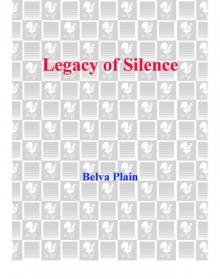 Legacy of Silence
Legacy of Silence Crossroads
Crossroads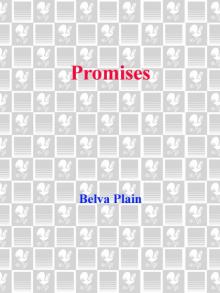 Promises
Promises After the Fire
After the Fire Tapestry
Tapestry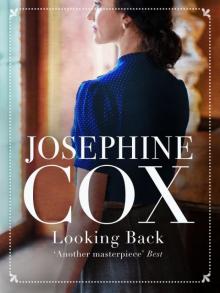 Looking Back
Looking Back Heartwood
Heartwood The Carousel
The Carousel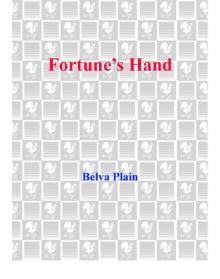 Fortune's Hand
Fortune's Hand Homecoming
Homecoming Random Winds
Random Winds Harvest
Harvest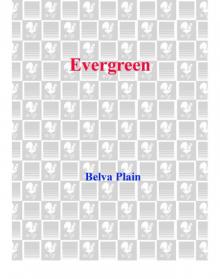 Evergreen
Evergreen Treasures
Treasures The Sight of the Stars
The Sight of the Stars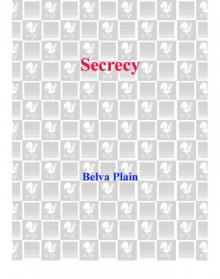 Secrecy
Secrecy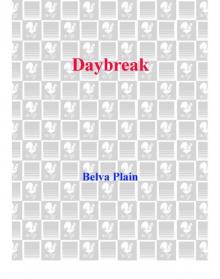 Daybreak
Daybreak Eden Burning
Eden Burning